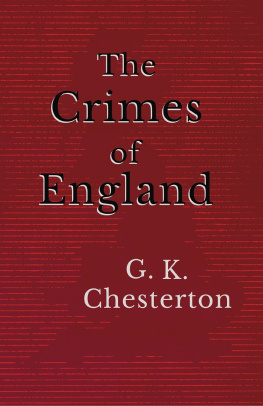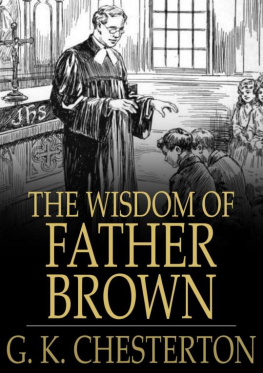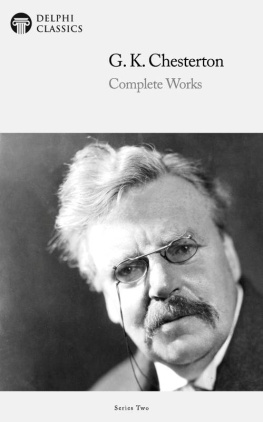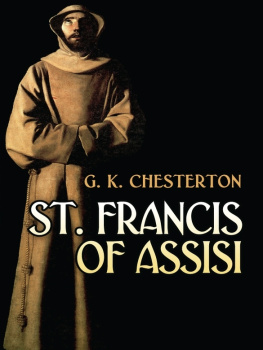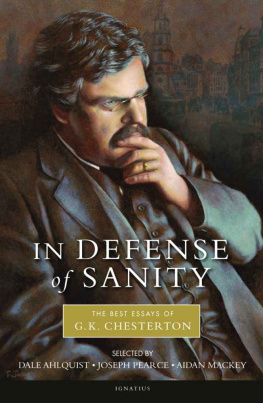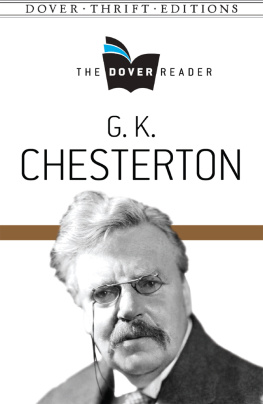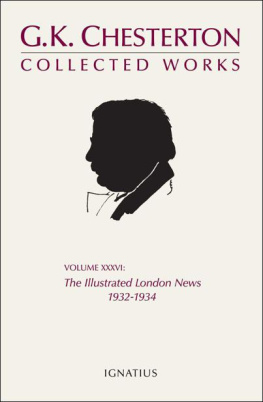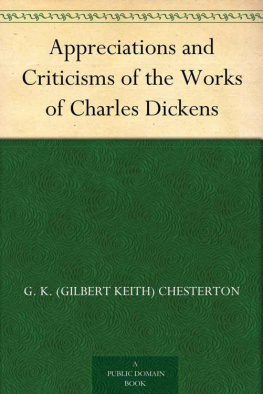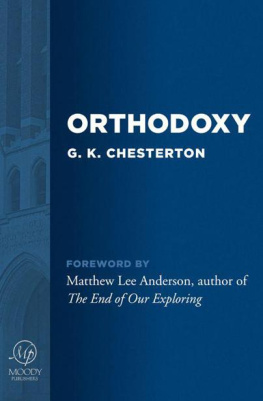THE CRIMES
OF ENGLAND
By
G. K. CHESTERTON
First published in 1915
Copyright 2020 Read & Co. History
This edition is published by Read & Co. History,
an imprint of Read & Co.
This book is copyright and may not be reproduced or copied in any
way without the express permission of the publisher in writing.
British Library Cataloguing-in-Publication Data
A catalogue record for this book is available
from the British Library.
Read & Co. is part of Read Books Ltd.
For more information visit
www.readandcobooks.co.uk
Contents
G. K . Chesterton
CHAPTER I
SOME WORDS TO PROFESS OR WHIRLWIND
CHAPTER II
THE PRO TESTANT HERO
CHAPTER III
THE ENIGMA OF WATERLOO
CHAPTER IV
THE COMING OF THE JANISSARIES
CHAPTER V
THE LOST ENGLAND
CHAPTER VI
HAMLET A ND THE DANES
CHAPTER VII
THE MIDNIG HT OF EUROPE
CHAPTER VIII
THE WRONG HORSE
CHAPTER IX
THE AWAKENIN G OF ENGLAND
CHAPTER X
THE BATTLE OF THE MARNE
G. K. Chesterton
Gilbert Keith Chesterton was an English journalist and author, who came of a family of estate-agents. He was born in London on the 29th of May 1874. He was educated at St Pauls school, which he left in 1891 with the idea of studying art. But his natural bent was literary, and he devoted himself mainly to cultivating that means of expression, both in prose and verse; he did occasional reviewing, and had some experience in a publishers office. In 1900, having already produced a volume of clever poems, The Wild Knight, he definitely took to journalism as a career, and became a regular contributor of signed articles to the Liberal journals, the Speaker and Daily News. He established himself from the first as a writer with a distinct personality, combative to a swashbuckling degree, unconventional and dogmatic; and the republication of much of his work in a series of volumes (e.g.Twelve Types, Heretics, Orthodoxy), characterized by much acuteness of criticism, a pungent style, and the capacity of laying down the law with unflagging impetuosity and humour, enhanced his reputation.
His powers as a writer are best shown in his studies of Browning (in the English Men of Letters series) and of Dickens; but these were only rather more ambitious essays among a medley of characteristic utterances, ranging from fiction (including The Napoleon of Notting-hill) to fugitive verse, and from artistic criticism to discussions of ethics a nd religion.
The interest excited by his work and views was indicated and analysed in an anonymous volume (G. K. Chesterton: a Criticism) publis hed in 1908.
A bio graphy from
1911, Encyclopdia Britannica, Volume 6
THE CRIMES OF ENGLAND
CHAPTER I
SOME WORDS TO PROFESSOR WHIRLWIND
Dear Professo r Whirlwind,
Your name in the original German is too much for me; and this is the nearest I propose to get to it: but under the majestic image of pure wind marching in a movement wholly circular I seem to see, as in a vision, something of your mind. But the grand isolation of your thoughts leads you to express them in such words as are gratifying to yourself, and have an inconspicuous or even an unfortunate effect upon others. If anything were really to be made of your moral campaign against the English nation, it was clearly necessary that somebody, if it were only an Englishman, should show you how to leave off professing philosophy and begin to practise it. I have therefore sold myself into the Prussian service, and in return for a cast-off suit of the Emperor's clothes (the uniform of an English midshipman), a German hausfrau's recipe for poison gas, two penny cigars, and twenty-five Iron Crosses, I have consented to instruct you in the rudiments of international controversy. Of this part of my task I have here little to say that is not covered by a general adjuration to you to observe certain elementary rules. They are, roughly speaking, as follows:
First, stick to one excuse. Thus if a tradesman, with whom your social relations are slight, should chance to find you toying with the coppers in his till, you may possibly explain that you are interested in Numismatics and are a Collector of Coins; and he may possibly believe you. But if you tell him afterwards that you pitied him for being overloaded with unwieldy copper discs, and were in the act of replacing them by a silver sixpence of your own, this further explanation, so far from increasing his confidence in your motives, will (strangely enough) actually decrease it. And if you are so unwise as to be struck by yet another brilliant idea, and tell him that the pennies were all bad pennies, which you were concealing to save him from a police prosecution for coining, the tradesman may even be so wayward as to institute a police prosecution himself. Now this is not in any way an exaggeration of the way in which you have knocked the bottom out of any case you may ever conceivably have had in such matters as the sinking of the Lusitania. With my own eyes I have seen the following explanations, apparently proceeding from your pen, (i) that the ship was a troop-ship carrying soldiers from Canada; (ii) that if it wasn't, it was a merchant-ship unlawfully carrying munitions for the soldiers in France; (iii) that, as the passengers on the ship had been warned in an advertisement, Germany was justified in blowing them to the moon; (iv) that there were guns, and the ship had to be torpedoed because the English captain was just going to fire them off; (v) that the English or American authorities, by throwing the Lusitania at the heads of the German commanders, subjected them to an insupportable temptation; which was apparently somehow demonstrated or intensified by the fact that the ship came up to schedule time, there being some mysterious principle by which having tea at tea-time justifies poisoning the tea; (vi) that the ship was not sunk by the Germans at all but by the English, the English captain having deliberately tried to drown himself and some thousand of his own countrymen in order to cause an exchange of stiff notes between Mr. Wilson and the Kaiser. If this interesting story be true, I can only say that such frantic and suicidal devotion to the most remote interests of his country almost earns the captain pardon for the crime. But do you not see, my dear Professor, that the very richness and variety of your inventive genius throws a doubt upon each explanation when considered in itself? We who read you in England reach a condition of mind in which it no longer very much matters what explanation you offer, or whether you offer any at all. We are prepared to hear that you sank the Lusitania because the sea-born sons of England would live more happily as deep-sea fishes, or that every person on board was coming home to be hanged. You have explained yourself so completely, in this clear way, to the Italians that they have declared war on you, and if you go on explaining yourself so clearly to the Americans they may quite possibly do the same.



